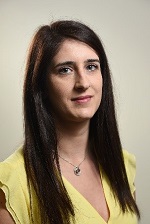ESTRO 2023 – Young Track
Report from a young principal investigator
This year’s ESTRO congress, which took place in Vienna, Austria, from 12 to 16 May, surpassed all my expectations. I have had the pleasure of attending the annual ESTRO congress multiple times, but this edition was nostalgic for me since my first ESTRO congress in 2017 was also held in Vienna. From a career standpoint, six years seem like an incredibly long time. When I attended ESTRO for the first time, I had recently completed my PhD and was enjoying the beginning of my postdoctoral experience. This time, I was accompanied by PhD students whom I supervise, newcomers to ESTRO, who were beaming with the excitement and anxiety of presenting their work to such a large audience for the first time. Unexpectedly, I found myself nervous for them too. Attending conferences was such an important experience during my PhD studies; it exposed me to the wider research context and brought the opportunity for external feedback, which makes you refine your research question and methodologies. I wanted them to have similarly positive and fulfilling experiences. I am aware that the depth and breadth of the cutting-edge research that is presented at an ESTRO congress can make the occasion a little bit overwhelming for newcomers who want to make the most of the diversity of tracks and sessions available (educational lectures, proffered papers, debates, etc) while ensuring that they are prepared for their own talks. Their blend of excitement and nervousness materialised into a profound sense of personal accomplishment for them (and of pride for me). The occasion served as a reminder of how engagement of the audience is a powerful source of validation and motivation for young researchers.
As a young principal investigator, I split my time between attending sessions to support students, colleagues and collaborators, and scientific sessions that aligned with my research interests. One of my highlights of the scientific programme was the session “The physics of late effects”. It was a full, rich session dedicated to diverse aspects of late-effect research and offered a line-up of incredible speakers. The session started with an overview of dose reconstruction in late-effects studies and its uncertainties. It bridged the challenges between historical and modern analyses of dosimetry data. This was followed by a comprehensive review of the role of imaging biomarkers in the prediction and quantification of toxicity, and their role in furthering our understanding (and mitigating for) the late effects of radiation. The final sessions were dedicated to modelling the side effects of radiotherapy, the barriers that currently impede their consideration in the support of clinical decisions, and critical thoughts and recommendations on predictive modelling and model evaluation and validation.
The other highlight of the congress for me was Professor Heidi Probst’s talk at the lunchtime symposium of the Young ESTRO track. She gave a raw and human description of her journey from cancer researcher to breast-cancer patient. I recommended the symposium to colleagues and students, and in my opinion, it exceeded all expectations. As a non-clinical researcher, it is easy sometimes to become disassociated from the patients’ experience. This session was a humble reminder of why we need research to improve cancer care, why we have a passion for this field, and that there is so much more to be done.
We also had the pleasure of attending the Young ESTRO dinner, which provided a great opportunity to interact with fellow young professionals, who share the same passion for radiotherapy and oncology, in a relaxed and informal setting to exchange ideas and experiences. Overall, in my opinion, the Young ESTRO track was very fitting of the society’s vision for 2030, “Radiation oncology: optimal health for all, together.”
It was a very different experience to attend ESTRO as a young principal investigator and extremely rewarding to see a new generation paving their own path. I was reminded of the excitement of meeting the scientists whose work served as the foundation and inspiration for my research. Leaving Vienna, the fear of missing out occupied my mind – thoughts such as “I should have attended more scientific sessions” and “I should have done more networking and team building activities” came with many others. The ESTRO 2023 congress was huge and it passed by very fast – so I am looking forward to ESTRO 2024 in Glasgow, UK!

Catarina Veiga
Department of Medical Physics & Biomedical Engineering
University College London
London, UK
c.veiga@ucl.ac.uk